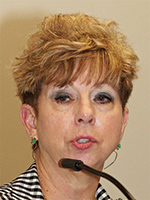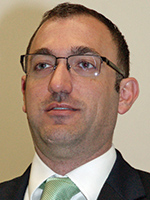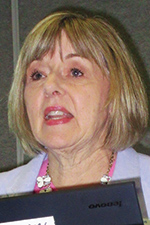News
NAMA State Council Officers Meet Offers Overview Of Local Advocacy
LAS VEGAS -- Leaders of the National Automatic Merchandising Association's affiliated state councils met during the 2018 NAMA Show here to review the past year. Pam Gilbert The breakfast led off with a summary of the national legislative and regulatory situation by NAMA government affairs experts. Pam Gilbert, the association's director, member communities, introduced director of state and federal affairs Jason Eberstein, who brought participants up to date on the industry's key national issues. Jason Eb...
August 12, 2018
LAS VEGAS -- Leaders of the National Automatic Merchandising Association's affiliated state councils met during the 2018 NAMA Show here to review the past year.
 |
| Pam Gilbert |
 |
| Jason Eberstein |
NAMA also is opposing proposals to open up the rest areas on federal highways to commercial development. Doing that would have a severe impact on blind vendors presently serving these rest stops under provisions of the Randolph-Shepard Act. Legislation has also been introduced in Congress to make this change.
NAMA has been working with blind vending operators and a coalition of industries, including truck stop operators, to counter these efforts; a meeting was held with leadership at the Department of Transportation, and a letter was sent to the Secretary of Transportation outlining the detrimental effect of commercialization on vending operators across the country. The association recently met with the leadership of the DOT to discuss this negative impact, and will continue to engage with Congress and the administration.
A third subject high on NAMA's list of regulatory priorities is the Environmental Protection Agency's rule requiring the phaseout of existing refrigerant gases and their replacement with a flammable refrigerant that would create problems for operators with refrigerated machines, under standards developed by UL and building codes based on them, as well as imposing a burden on equipment manufacturers. The changeover is required under the EPA's "Significant New Alternatives Policy" (or SNAP), an Obama administration initiative intended to mitigate global warming. NAMA is working to extend the time allowed for the transition.
"We're not at the finish line yet," Eberstein said, "but we think we can get an extension."
 |
| Sandy Larson |
 |
| Sheree Edwards |
Larson, who has worked effectively with local governments on drafting real-world guidelines for micromarkets, pointed out that another area of concern to operators is the imposition of rules governing what can and cannot be sold through micromarkets on state property. "We're working on that," she said. On a positive note, Larson continued, some states have undertaken to enact laws curtailing the authority of local governments to enact beverage taxes.
The meeting culminated in brief reports by the leaders of the participating associations, summarizing their achievements to date and their plans for the future.
 ChatGPT
ChatGPT Grok
Grok Perplexity
Perplexity Claude
Claude






